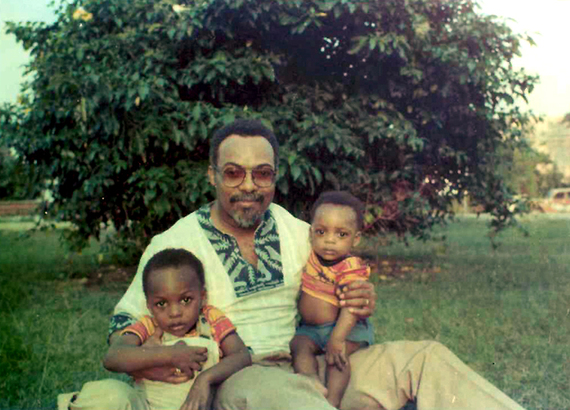 The author, his father Lindsay Barrett, and his brother Boma, circa 1982.
The author, his father Lindsay Barrett, and his brother Boma, circa 1982.
1.
In a cool, shaded bedroom in the southern city of Port Harcourt, my mother is lying on her back on the rumpled bed, a book held open over her face, her eyes burning into it. I’m three years old and I want her to love me. I want her to look at me right this moment — to tell me all the time how much I mean to her. I have been perched at the bed’s edge for some time, waiting to be noticed, watching the play of expressions on her face. When she quivers again with laughter I can’t hold back my curiosity any longer, and I ask, “Why are you laughing, Mama?”
No answer. I cannot understand what she finds so fascinating in that bundle of paper.
I raise my voice. “Mama! Tell me why you’re laughing.” My cry works: it draws her eyes to me. But they are bright with an emotion I know isn’t for me.
“Go and play with Boma,” she says. And then she mutters under her breath: “You’ll understand why I’m laughing when you can read.”
Boma, my younger brother, is a baby. He cries all the time. Right now he is in my father’s arms in the parlor — I can hear him wailing for attention, as usual. When he arrived he took away a chunk of the affection that I thought was only mine, and now this thing, this book that brightens my mother’s eyes and makes her giggle, is stealing what’s left.
I want to be a book. I want my mother to look at me all the time.
I decide to learn to read.
2.
My mother and my father quarrelled over me yesterday. My father is teaching me to read, I asked him to, but yesterday he grew annoyed at my slow progress over the letter X and he smacked my bottom until I screamed for my mother. My mother took me in her arms, she said I was too young and he should go easy on me, that I was learning faster than many my age. He’s old enough — he shouldn’t have asked if he wasn’t ready, my father said before he slammed his study door.
I’m old enough.
Tomorrow I will try to be ready.
In a few weeks I will be four.
3.
Crouched in a closed dark wardrobe, my heart pounding, I’m listening to the sound of feet outside. The footfalls sneak closer, stop in front of the wardrobe, and I strain my ears. I wait fearfully to be caught.
I’m six years old and I have no friends. Everybody loves Boma. He’s playful, friendly, and he’s not afraid of cats. He laughs all the time: a deep rolling laugh that sounds like a toy version of my father’s. He looks like my father too. Everybody says so. Then they ask me whom I resemble, why am I so quiet, why am I such a bookworm? That’s what Priye asked:
“Why are you such a bookworm?”
“Because books are exciting, stupid!” I snap at her. Then I feel sorry. Girls must always be treated nicely, my mother says.
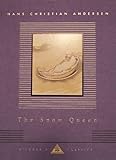 Priye always comes over to play with Boma. She is the daughter of Uncle Sam, our next-door neighbor and my father’s best friend on the street. My father and Uncle Sam are chatting in the study, laughing out loud, and Priye is in my bedroom searching for me. Boma is hiding—we are playing hide-and-seek. I was reading The Snow Queen when Priye came, but after she asked me to join her and Boma in their game, I dropped my book. The Snow Queen makes me cold and sad and lonely. And no one ever asks me to play.
Priye always comes over to play with Boma. She is the daughter of Uncle Sam, our next-door neighbor and my father’s best friend on the street. My father and Uncle Sam are chatting in the study, laughing out loud, and Priye is in my bedroom searching for me. Boma is hiding—we are playing hide-and-seek. I was reading The Snow Queen when Priye came, but after she asked me to join her and Boma in their game, I dropped my book. The Snow Queen makes me cold and sad and lonely. And no one ever asks me to play.
Now I’m crouched in the wardrobe, hoping to be found so I can return to my book.
4.
Boma and I are on holidays with my father in a big empty house in the mid-western city of Benin. I miss my mother, who is back at home in Port Harcourt, and I hope she’s missing me too. My father has taken Boma out shopping, and I’m alone at home. I’m being punished for throwing a crying tantrum. Because my younger brother ran off with my book and I couldn’t catch him.
I’m nine years old and I’m afraid that my parents don’t love each other anymore.
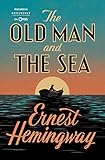 Now I’m lying on my belly in my father’s bed. I’m reading The Old Man and the Sea.
Now I’m lying on my belly in my father’s bed. I’m reading The Old Man and the Sea.
I want to be a fisherman when I grow up. O to roam the seas with a book and a hook!
5.
My mother refuses to buy me trousers. She prefers small shorts in bright colours: pink, lime green, powder blue. When I walk down my street the other boys tease me about the books I’m always carrying. They call me a girl because I read too much, because of my bright shorts and my smooth soft legs, and because I look like a girl. My mother tells me they are unruly little bullies. But still she refuses to buy me trousers. “Nobody bullies Boma,” she always says when I complain. But that’s because Boma never walks around with books. And he can fight.
But I don’t say this. I’m almost 10 and it’s a sin to rat on a brother.
I want to be a pirate when I grow up.
6.
 I’m in a classroom of boys and girls all shrieking with abandon. The teacher has stepped outside, and while my classmates rush about I remain seated at my desk. I’m reading a novel: Roots.
I’m in a classroom of boys and girls all shrieking with abandon. The teacher has stepped outside, and while my classmates rush about I remain seated at my desk. I’m reading a novel: Roots.
The series runs every night on national TV.
My mother’s friend, Aunty Gloria, lent me the book when I told her how much I feared for Kunta Kinte, how disappointed I was that the bad men were winning the good ones. I couldn’t wait to see the good men begin to win. In the fairytales the good men always win.
“Read the book,” Aunty Gloria said. “You’re old enough to learn how the world really is.”
I’m 10 years old.
A strong wind now blows the scent of sunlight through the open windows of the classroom, and it riffles the book’s pages. Then a shadow looms, the wind is blocked, and I look up. Gogo is standing beside my desk and frowning down at me. I’m worried, threatened by his presence, but I’m not surprised to see him. Gogo has been trying to pick a fight with me for the past few weeks, ever since I scored the highest in the English Language test. He hasn’t succeeded only because he’s the strongest boy in the class and it’s not considered cowardly to run from him. All this time I have been a running target, but now I’m a sitting duck. And I know that he knows it. I lower my eyes from his, and I hear him say, “What are you reading?”
“Roots,” I answer. Then I hurry to explain, my voice soft, trembling, ingratiating. “They show it every night on NTA. It’s the Kunta Kinte film.”
“Give it to me,” he says, and extends his hand.
I don’t like sharing my books, but I hand it to him anyway. Maybe he likes books like me.
No, he doesn’t. He closes the book and flings it across the classroom. It flaps through the open window and falls in the sand outside. Then he bends over my desk and laughs ha ha ha into my face. I feel like crying — I borrowed that book. You must take good care of books, my mother always says.
The class falls silent as I rise slowly to my feet. My face is burning and I feel like peeing. I know Gogo wants me to cry so he can laugh a real laugh, and this knowledge gives me the strength to fight back my tears. I step out of my desk and walk towards the window.
“Stop there!” Gogo yells, and though I flinch at his shout, I don’t stop. I can now hear him coming behind me — he is banging on desktops to frighten me. I reach the window, and then turn around, and he stops five desks away. His face is really, really angry.
“Did you hear me say stop?”
I don’t answer. I hold his gaze.
“Are you looking at me with bad eye? Do you think you can fight me, you son of a–?”
I am shocked.
Gogo has called me a dirty word that means my mother does dirty things.
I am angry too. Bitterness rises inside my mouth, and my hands are cold, my knees tremble, my chest is tight, but my fear is beginning to harden. I did nothing to him and yet he threw away my book and now he has abused my mother. I must say what I must say. I must spit out this bitter taste.
“You unruly little bully,” I say to Gogo. But he isn’t, not really, not little. He’s much taller than me, and he has muscles on his calves, his chest, his arms — the veins in his arms are like the ones in my father’s, it seems to me. Gogo looks exactly like I want to be someday: strong.
But right now, for the first time in my life, I’m ready to fight someone who isn’t Boma — all because of a book. I will be beaten, disgraced, and I know it, Gogo knows I know it, the whole class knows it, they are chanting, cheering me on, goading Gogo, and he lets out a kung-fu howl and charges at me. O Mama! But my book, my mother — I can’t run. I hold my ground until my teeth chatter, until I can almost feel his breath on me, and then my instincts revolt. I leap out his path and raise my hands to shield my face, but nothing, no blows, only a crash of glass and a child’s wail, and when I look up I see Gogo squirming in pain on the sand outside. He has run himself into the window and through the louver glasses. I feel a rush of fear, and then relief, a deep satisfaction.
The bad boy has lost.
My faith in the world’s order is now restored.
I’m ready to go back to reading Roots.
And so I climb out the window and pick up my book, shake off the glass, and go back in to meet the cheers of my classmates, boys and girls, who gather around and pat my back, stare at me with admiration. My head swells with pride.
Behind me, I can still hear Gogo crying.
7.
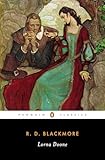 On a quiet Port Harcourt afternoon, I’m rereading Lorna Doone for the seventh time when I hear a shout. It is Boma. I’m in our bedroom in my grandmother’s house, and there are adults outside so I don’t get out of bed, I don’t interrupt my reading, I hope Boma is fine. My mother is away in Ibadan studying for her university degree. I haven’t seen or heard from my father since he and my mother fought the last time in Benin City. Boma and my books are all that’s left of the home I’ve always known.
On a quiet Port Harcourt afternoon, I’m rereading Lorna Doone for the seventh time when I hear a shout. It is Boma. I’m in our bedroom in my grandmother’s house, and there are adults outside so I don’t get out of bed, I don’t interrupt my reading, I hope Boma is fine. My mother is away in Ibadan studying for her university degree. I haven’t seen or heard from my father since he and my mother fought the last time in Benin City. Boma and my books are all that’s left of the home I’ve always known.
I’m 12 years old and I want to be an aeronautical engineer when I grow up.
Then the bedroom door flies open and Boma skips in with a two large shopping bags clutched in his hands. “Toys!” he cries excitedly. “The robot’s mine!” He dumps the bags on the floor, drops down beside them, upends one and spills out the toys. There’s only one father in the whole wide world who would buy so many toys. I tumble off the bed.

 In the second bag there are books — a box set of The Hardy Boys, Burning Grass by Cyprian Ekwensi, Treasure Island, a children’s encyclopedia with an airplane on the cover — and there is a letter addressed to me. I am shaking as I tear it open, and then blinking away tears as I read.
In the second bag there are books — a box set of The Hardy Boys, Burning Grass by Cyprian Ekwensi, Treasure Island, a children’s encyclopedia with an airplane on the cover — and there is a letter addressed to me. I am shaking as I tear it open, and then blinking away tears as I read.
My father is in Liberia, where there’s a civil war, and he’s writing about it for the newspapers. He loves me, he misses me, he’s sorry he and my mother are no longer together, and he plans to see me and Boma soon. He hopes I still read as much as I did.
I do, Daddy. I still do.
8.
My mother has a boyfriend. His name is Uncle Albert and he wears glasses, he smells of shaving creams I remember from long ago, and when he responds to my greeting I am disappointed. He sounds like a nice person. He even looks like a nice person — he wears a tie and his eyes are kind.
Now I am certain my mother doesn’t love me anymore.
How can she? I have strange moods, I dream strange dreams, and I feel good when I read bad books — books with sex in them. And I’m ashamed all the time, shy with everybody, especially girls.
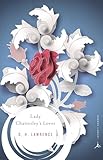 Boma isn’t shy. That’s why he’s in the parlor right this moment talking with my mother and Uncle Albert — the little traitor. I’m hidden in the bedroom. I’ve recently begun reading Lady Chatterley’s Lover, I started this morning before Uncle Albert arrived, but now I’m stuck on page 17. I’m distracted by their chatter.
Boma isn’t shy. That’s why he’s in the parlor right this moment talking with my mother and Uncle Albert — the little traitor. I’m hidden in the bedroom. I’ve recently begun reading Lady Chatterley’s Lover, I started this morning before Uncle Albert arrived, but now I’m stuck on page 17. I’m distracted by their chatter.
But I learn from it. Uncle Albert is a medical doctor, he lives in Lagos, he makes my mother laugh like she hasn’t in a long time, and when she calls out my name and I push my head through the parlor doorway, Uncle Albert says in his soft nice voice:
“I hear you read a lot. That’s good. What book are you reading now?”
“Lady Chatterley’s Lover,” I mumble in reply — and then I wonder what I have done again. My mother is ashamed; I can see it in the way she hides her face. Uncle Albert is embarrassed, and he clears his throat, then removes his glasses and busies his hands with wiping them. Boma is humming happily as he watches cartoons on TV.
My mother finally speaks. “You’re 14,” she says, and she exchanges a look with Uncle Albert. “You’re old enough, I guess.” I have no idea what she means, and I grow angry thinking she’s been talking about me behind my back. With her boyfriend whom I’m meeting for the first time today.
Betrayals everywhere I turn.
Later that night, while Boma’s asleep beside me and my mother and Uncle Albert have gone out with friends, I turn another page of Lady Chatterley’s Lover, my eyes fleet over the words, and my heart crashes to a stop. I finally understand.
Without knowing, I have alerted my mother to my hidden interests. In front of her boyfriend.
Betrayals everywhere I turn, even by books.
I’m sick with shame, but I read on, and soon my bad feeling changes to good.
9.
My mother is mad at me. I have just told her she loves Boma more than me and that she treats me like a child and I will not go to university because that’s what she wants and I will never do what she wants. I am screaming as I say this, and crying too. Boma is standing beside my mother, his arm resting on her shoulder, holding her back. His face pleads with me.
“You have no respect!” my mother screams back. “How can you talk to me that way? Either you obey me or you get out of my house!”
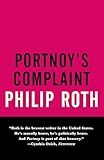 Early the next morning, before Boma wakes, I creep out of our bedroom with three shirts and two boxer shorts in a Snoop Dogg rucksack, my toothbrush in my jeans pocket, and one book in my hand. Portnoy’s Complaint.
Early the next morning, before Boma wakes, I creep out of our bedroom with three shirts and two boxer shorts in a Snoop Dogg rucksack, my toothbrush in my jeans pocket, and one book in my hand. Portnoy’s Complaint.
I’m 18 and I finished secondary school one month ago. I have now lived in the western city of Ibadan for two years, and still I have no friends to run to. But still I run.
10.
I’m standing in the front yard of a house in the southern town of Yenagoa. I’m waiting for my father; he’s inside with his wife and my two half sisters. After a lifetime spent with Boma, it feels strange to hear a three year old call me her brother. The one year old cries all the time. Like Boma did. She even looks like him.
I’m holding a book in one hand and my mobile phone in the other. I just finished speaking on the phone with my mother. She sounds fine, but she misses me. I miss her too.
 The book I’m holding is the book that convinced me to give up my plan of becoming a farmer. Love in the Time of Cholera. I carry it everywhere, a talisman against my fear of failure.
The book I’m holding is the book that convinced me to give up my plan of becoming a farmer. Love in the Time of Cholera. I carry it everywhere, a talisman against my fear of failure.
I’m 26 and I want to be a writer.
My father appears in the doorway. “Are you sure you won’t come inside?” he asks. “I’m still writing my column. You can come and sit with me in the study. I’ll soon finish.”
“I’m okay, Dad,” I say. “I’m getting some fresh air. Take your time.”
He opens his mouth to speak, but the three year old calls out, “Daddy!” and without speaking he retracts his head, the bead curtain sways and clatters where he stood. Then my phone rings; I glance at the screen. I think it might be mother calling back, but no, it’s an unsaved number, a foreign number it seems. I wonder if I should answer, and then I do.
The caller tells me she works for the BBC and that I have just won the short story competition I’d forgotten I entered. I say my name and the title of my story — I ask if she is sure it’s me she meant to call. Yes, she confirms. Everything else is wind in my ears.
After I hang up, I call out to my father. He appears in the doorway.
“What is it, Son?”
I tell him everything. And when he rushes forward and throws his arms around me, squeezes me, says how proud he is, I feel again like the son who learned to read in his father’s lap.
I dropped out of university a little less than two months ago.
11.
I have just written the final word in my second book.
 Tonight I will reread The Tin Drum: a present from my father on my 28th birthday.
Tonight I will reread The Tin Drum: a present from my father on my 28th birthday.
But first I’ll go next door to share the good news with Boma. And then I’ll use his phone to call my mother in London. This time I must remember to thank her.
I’ve understood for years why she was laughing.
I’m 33, I live in Lagos, and when I’m not reading books, I write books for a living.
Image courtesy of the author.









